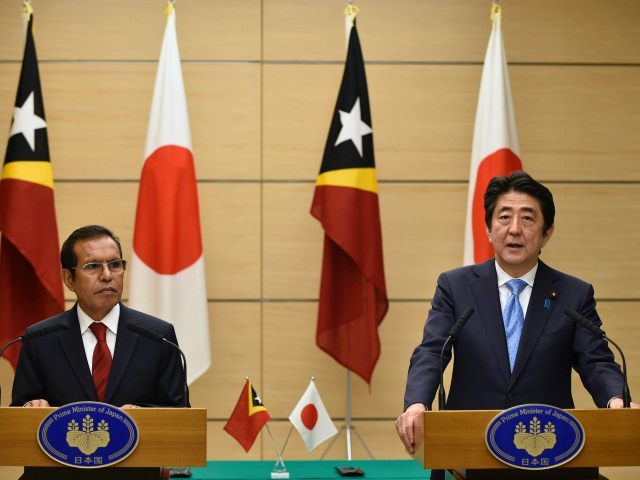In a joint statement, Japanese Prime Minister Shinzo Abe and his counterpart President Taur Matan Ruak of East Timor noted their “serious concern” that the Chinese government is expanding its control over disputed territory in the South China Sea too aggressively.
The heads of state noted their “serious concern over the recent situation in the South China Sea” without explicitly condemning China and vowed “opposition to any unilateral actions that could change the status quo and increase tensions.” “It was significant that (Japan) affirmed coordination with East Timor, a country that shares the principle of the rule of law, in realizing open and stable seas,” Prime Minister Abe is quoted as saying.
The two leaders spoke at a press conference together marking Ruak’s first visit to Japan, in which they announced that Japan would contribute $44 million in development aid to the tiny infant nation, as well as vow to aid its expansion of maritime security infrastructure.
The move is a surprising one from East Timor, which does not stake any claims in the waters China claims as its own in the South China Sea, has never previously expressed an opinion on the issue, and has taken significant financial aid from China. The Sydney Morning Herald noted in a column last year that East Timor, founded in 2002, had its presidential palace, all its foreign ministry buildings, and multiple military facilities built by the Chinese government. The column suggests East Timor grew close to China due to Australia’s refusal to grant it control over oil-rich maritime territory.
Ruak visited China most recently in September 2015. At the time, President Xi Jinping vowed further development aid for the infant nation and issued a rallying call to private Chinese business to invest in East Timor. In January, Chinese war vessels made a visit to East Timor to exchange “anti-terrorism experience” and foster ties between the two nations’ navies.
The Chinese government has not yet issued an official reaction to East Timor’s statement concerning the South China Sea.
While East Timor is a new player in the ongoing South China Sea tensions, Japan has long taken a stance against illegal Chinese development in the region. China began construction on illegal artificial islands in the Spratly and Paracel island chains two years ago and has since installed a number of military facilities in both territories, including the placement of surface-to-air missiles and the ongoing development of an advanced radar system. While the nations contesting the territory in question have protested the loudest — the Philippines and Vietnam in particular — Japan has offered its aid to these countries in the quest to oust China from their land.
In February, Japan announced an agreement with the government of the Philippines to allow for ongoing military purchases. While no specific purchase has been announced yet, observers expect Japan to offer the Philippines surveillance aircraft to be used in keeping track of illegal Chinese activities in Philippine waters. This month, Japan announced it would send the Philippines a submarine to navigate the local waters, irritating China.
The United States, which has conducted two freedom of navigation exercises in the region to counter Chinese expansion, has urged Japan to join with other major powers to curb Beijing. “Exercising together will lead to operating together. By being ambitious, India, Japan, Australia and the United States and so many like-minded nations can aspire to patrol together anywhere international law allows,” the head of U.S. Pacific Command, Admiral Harry B. Harris, said earlier this month while on a visit to India.
Australian officials are currently meeting with Malaysian government officials to discuss how to best respond to China’s moves in the region. Australia has also been expanding its naval arsenal with purchases of Japanese vessels, something U.S. Pacific fleet commander Admiral Scott Swift said Washington was “agnostic” about. He noted, however, that concerns over Chinese activity should override minor issues with how Australia arms itself, urging action against “unprecedented examples of aggressive construction and militarisation” without mentioning China.
“The resulting climate of uncertainty not only threatens freedom of the seas, it chips away at the rules-based system, it encourages nations to transfer an ever larger share of national wealth to the purchase of naval weapons beyond what is needed for merely personal defence,” he added.

COMMENTS
Please let us know if you're having issues with commenting.